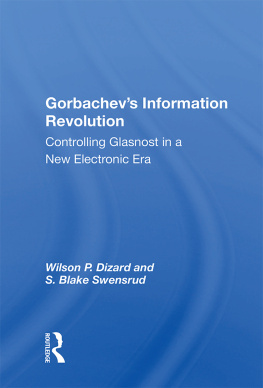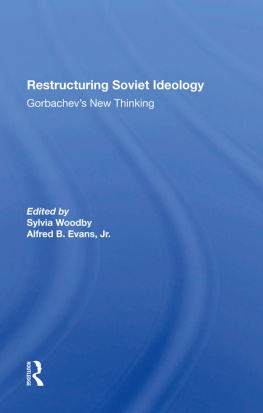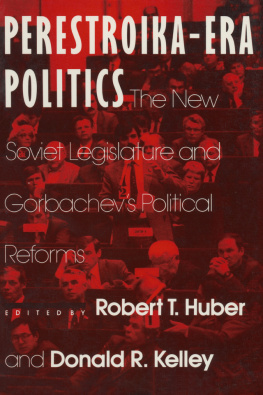Volume IX, Number 8
Significant Issues Series
Gorbachevs Information Revolution
Controlling Glasnost in a New Electronic Era
Wilson P. Dizard and S. Blake Swensrud
The Center for Strategic and International Studies
First published 1987 by Westview Press
Published 2018 by Routledge
52 Vanderbilt Avenue, New York, NY 10017
2 Park Square, Milton Park, Abingdon, Oxon OX14 4RN
Routledge is an imprint of the Taylor & Francis Group, an informa business
Copyright 1987 by the Center for Strategic and International Studies, Washington, D.C.
All rights reserved. No part of this book may be reprinted or reproduced or utilised in any form or by any electronic, mechanical, or other means, now known or hereafter invented, including photocopying and recording, or in any information storage or retrieval system, without permission in writing from the publishers.
Notice:
Product or corporate names may be trademarks or registered trademarks, and are used only for identification and explanation without intent to infringe.
Library of Congress Cataloging-in-Publication Data
Dizard, Wilson P.
Gorbachev's information revolution.
(CSIS significant issues series, ISSN 0736-7136; v. 9, no. 8)
1. CommunicationSoviet Union. 2. Communication policySoviet Union.
3. Soviet UnionPolitics and government1982.
1. Swensrud, S. Blake. II. Title. III. Series: Significant issues series;
v. 9, no. 8. IV. Title: controlling glasnost in a new electronic era.
P92.S.65D59 1987 001.51'0947 87-27914
ISBN 13: 978-0-367-01448-3 (hbk)
Wilson P. Dizard is a senior fellow in international communications at the Center for Strategic and International Studies in Washington. He is also an adjunct professor of international affairs at the School of Foreign Service, Georgetown University. Before joining the Center, Mr. Dizard was a senior foreign service officer. His most recent publication is The Coming Information Age (New York: Longman Publishers, 2d ed., rev. 1985). Two additional publications by Dizard that touch on issues of this current study are TelevisionA World View (Syracuse, N.Y.: Syracuse University Press, 1966) and The Strategy of Truth (Washington: Public Affairs Press, 1961).
S. Blake Swensrud was a research assistant in the international communications program at the Center for Strategic and International Studies during the preparation of this study. A graduate of Tufts University, he is currently in the graduate international affairs programmer George Washington University.
The global information revolution, which has had a tremendous impact on all aspects of life in Western democracies, is beginning to affect the various communist countries, including the Soviet Union itself. That regime, rising from the ashes of an empire traditionally aloof from other societies, apprehensive of subversive movements, and secretive about its inner workings, has operated almost from the beginning on the principle of maintaining an information monopoly.
The Western lead in the new communications technologies makes possible a greater circulation of information from the West to Soviet-bloc populations, despite regime efforts to keep it out, At the same time, these technologies are becoming increasingly indispensable to the industrial and military strength and to the growth and smooth functioning of the economies of all developed countries, including the Soviet Union.
In the mass media and the cultural fields, the communist regime would prefer to keep out information or cultural influences from abroad, while the West is interested in seeing that such information gets in. In the science and technology fields, and particularly in computerization and advanced telecommunications, it is the Soviet Union and other communist countries that want to bring the latest information in, while the West (led by the United States), for national security reasons, would rather keep the most advanced of this information out of communist hands.
By comparison with developments in the West, the Soviets have been plagued by the relative failure of their scientific and technological sectors to come up with innovative discoveries and practical applications beneficial to the Soviet economy. This failure is attributable to the communication flow problems within the Soviet scientific and technical communityproblems directly related to regime reluctance to give up its monopoly on information.
For decades, elements within the Soviet Union have understood the need to overcome the lack of scientific innovation and to introduce greater modernization and quality control in indust as well as the key role microelectronics (in computerization and telecommunications) must play in this process. Their efforts have been resisted by the traditionalists or conservatives who have equated openness to the West with vulnerability to ideological subversion.
It appears that Mikhail Gorbachev has made a calculated decison to side with the nontraditionalists. Wilson Dizard and S. Blake Swensrud have cogently analyzed Gorbachev's perestroika and its relationship to the information revolution. There are those who argue that for Gorbachev, the real goal is perestroika , while glasnost is only a means incidental to that goal. History and logic, however, lead to the conclusion that for the Soviets to respond adequately to the impelling force of the global information revolution, glasnost and perestroika are equally required.
Dr. Walter R. Roberts
Diplomat in Residence, The George Washington University
Former Associate Director, U.S. Information Agency
1
The Gorbachev Challenge
In the early years after the Russian revolution, Leon Trotsky reportedly proposed to Stalin that a modern telephone system be built in the new Soviet state. Stalin brushed off the idea, saying, "I can imagine no greater instrument of counter-revolution in our time."
This incident reflects the traditional ambivalence of Soviet leaders between the need for an adequate national communications system and the fear of losing control of their information monopoly. One result is that the USSR has the lowest per capita distribution of telephones among the industrialized nations10 per 100 citizens. Most other civilian communications resources are equally poor.
In Mikhail Gorbachev's Soviet Union, pragmatic needs are forcing a new look at the dilemma between tight information control and economic efficiency. In his campaign to shake up the economy, the Soviet leader's biggest gamble may be his plans for a massive upgrading of communications and information facilities, from ordinary telephones to high-tech computers. Whether he succeeds will not be clear for a long time. What is clear is that Gorbachev is intent on moving toward a Soviet version of a Western information-based economy.
The outside world's attention in this area has been focused on one aspect of Gorbachev's information policiesthe so-called glasnost campaign, aimed at providing more credible content in Soviet media and the arts. Glasnost (openness) has already had the effect of appearing to legitimize the new leader's agenda of economic and social reforms. It is a potentially hopeful factor in the prospect for a long-term evolution toward a more open, less repressive society. One of the hallmarks of such an evolution will be the modification, and eventual phasing out, of long-standing controls over communications and information resources.









